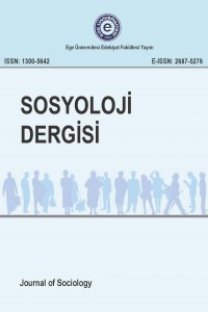Çocuğun Değeri ve Aile Değişimi: Türkiye’den Otuz Yıllık Bir Portre
çocuğun değeri
___
- AGHAJANIAN, A. (1988). The value of children in rural and urban Iran: A pilot study. Journal of Comparative Family Studies, 19, 85–97.
- ATACA, B. (1992). An investigation of variance in fertility due to sex-related differentiation in child-rearing practices. Unpublished master’s thesis, Bogazici University, Istanbul, Turkey.
- ATACA, B., & SUNAR, D. (1999). Continuity and change in Turkish urban family life. Psychology and Developing Societies, 11, 77–90.
- BULATAO, R.A. (1979a). On the nature of the transition in the value of children. Papers of the East-West Population Institute (No. 60-A). Honolulu, HI: EastWest Center.
- BULATAO, R.A. (1979b). Further evidence of the transition in the value of children. Papers of the East-West Population Institute (No. 60-B). Honolulu, HI: EastWest Center.
- DARROCH, R.K., MEYER P.A., & SINGARIMBUN, M. (1981). Two are not enough: The value of children to Javanese and Sudanese parents (No. 60-D). Honolulu, HI: East-West Population Institute.
- DEKOVIC, M., PELS, T., & MODEL, S. (in press). Unity and diversity in child rearing: Family life in a multicultural society. London: Mellen Press.
- DUBEN, A. (1982). The significance of family and kinship in urban Turkey. In C. Kağıtçıbaşı (Ed.), Sex roles, family and community in Turkey (pp. 73–99). Bloomington, IN: Indiana University Press.
- ERELCİN, F.G. (1988). Collectivistic norms in Turkey: Tendency to give and receive support. Unpublished master’s thesis, Bogazici University, Istanbul, Turkey.
- FAWCETT, J.T. (Ed.) (1972). The satisfactions and costs of children: Theories, concepts, methods. Honolulu, HI: East-West Center.
- FAWCETT, J.T. (1983). Perceptions of the value of children: Satisfactions and costs. In R. Bulatao, R.D. Lee, P.E. Hollerbach, & J. Bongaarts (Eds.), Determinants of fertility in developing countries (Vol. 1, pp. 347–369). Washington, DC: National AcademyPress.
- HOFFMAN, L.W. (1987). The value of children to parents and child rearing patterns. In C. Kağıtçıbaşı (Ed.), Growth and progress in cross-cultural psychology (pp. 159–170). Lisse, The Netherlands: Swets & Zeitlinger.
- HOFFMAN, L.W., & HOFFMAN, M.L. (1973). The value of children to parents. In J.T. Fawcett (Ed.), Psychological perspectives on education (pp. 19–76). New York: Basic Books.
- HOLLOS, M., & LARSEN, U. (1997). From lineage to conjugality: The social context of fertility decisions among the pare of Northern Tanzania. Social Science and Medicine, 45, 361–372.
- IMAMOGLU, E.O. (1987). An interdependence model of human development. In C. Kağıtçıbaşı (Ed.), Growth and progress in cross-cultural psychology (pp. 138–145). Lisse, The Netherlands: Swets & Zeitlinger.
- JOSE, P.E., HUNTSINGER, C.S., HUNTSINGER, P.R., & LIAW, F-R. (2000). Parental values and practices relevant to young children’s social development in Taiwan and the United States. Journal of Cross-Cultural Psychology, 31, 677–702.
- KAĞITÇIBAŞI, C. (1982a). The changing value of children in Turkey (No. 60-E). Honolulu, HI: East-West Center.
- KAĞITÇIBAŞI, C. (1982b). Old age security value of children and socioeconomic development: Cross-national evidence. Journal of Cross-Cultural Psychology, 13, 29–42.
- KAĞITÇIBAŞI, C. (1990). Family and socialization in cross-cultural perspective: A model of change. In J. Berman (Ed.), Cross-cultural perspectives: Nebraska symposium on motivation, 1989 (pp. 135–200). Lincoln, NE: Nebraska University Press.
- KAĞITÇIBAŞI, C. (1996a). Family and human development across cultures: A view from the other side. Hillsdale, NJ: Lawrence Erlbaum.
- KAĞITÇIBAŞI, C. (1996b). The autonomous-relational self: A new synthesis. European Psychologist, 1, 180–186.
- KAĞITÇIBAŞI, C. (1998). Human development: Cross-cultural perspectives. In J.G. Adair & D. Belanger (Eds.), Advances in psychological science: Vol. 1. Social, personal, and cultural aspects (pp. 475–494). Hove, UK: Psychology Press.
- KAĞITÇIBAŞI, C. (2004). Autonomy and relatedness in cultural context: Implications for self and human development. Manuscript submitted for publication.
- PHALET, K., & SCHÖNPFLUG, U. (2001). Intergenerational transmission of collectivism and achievement values in two acculturation contexts: The case of Turkish families in Germany and Turkish and Moroccan families in the Netherlands. Journal of Cross-Cultural Psychology, 32, 186–201.
- STEWART, S.M., BOND, M.H., DEEDS, O., & CHUNG, S.F. (1999). Intergenerational patterns of values and autonomy expectations in cultures of relatedness and separateness. Journal of Cross-Cultural Psychology, 30, 575–593.
- YANG, C.F. (1988). Familism and development: An examination of the role of family in contemporary China Mainland, Hong Kong, and Taiwan. In D. Sinha & H.S.R. Kao (Eds.), Social values and development: Asian perspectives (pp. 93–123). London: Sage.
- ISSN: 1300-5642
- Yayın Aralığı: 2
- Başlangıç: 1987
- Yayıncı: Ege Üniversitesi, Edebiyat Fakültesi
"Leisure and Consumption": A Comprehensive and Elaborate Work Despite Some Missing Points
Çocuğun Değeri ve Aile Değişimi: Türkiye’den Otuz Yıllık Bir Portre
"Leisure and Consumption": A Comprehensive and Elaborate Work Despite Some Missing Points
Ten Rengi Ayrımcılığı: Afro-Türkler Örneği
Psikiyatrinin Toplumsal Etkilerine Dair Nitel Bir Araştırma: Ege Üniversitesi Örneği
